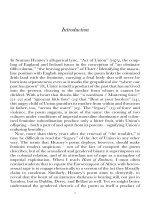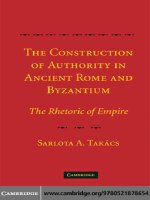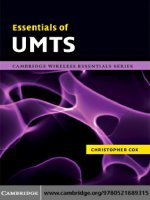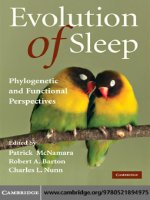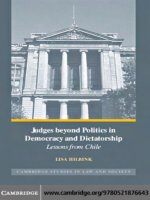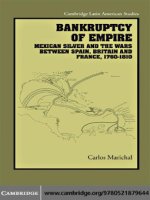0521515947 cambridge university press translations of authority in medieval english literature valuing the vernacular apr 2009
Bạn đang xem bản rút gọn của tài liệu. Xem và tải ngay bản đầy đủ của tài liệu tại đây (1.85 MB, 290 trang )
This page intentionally left blank
TRANSLATIONS OF AUTHORITY IN MEDIEVAL
ENGLISH LITERATURE
In Translations of Authority in Medieval English Literature, leading
critic Alastair Minnis presents the fruits of a long-term engagement
with the ways in which crucial ideological issues were deployed in
vernacular texts. The concept of the vernacular is seen as possessing a
value far beyond the category of language – as encompassing popular
beliefs and practices which could either confirm or contest those
authorized by church and state institutions.
Minnis addresses the crisis for vernacular translation precipitated
by the Lollard heresy; the minimal engagement with Nominalism in
late fourteenth-century poetry; Langland’s views on indulgences; the
heretical theology of Walter Brut; Margery Kempe’s self-promoting
Biblical exegesis; and Chaucer’s tales of suspicious saints and risible
relics. These discussions disclose different aspects of ‘vernacularity’,
enabling a fuller understanding of its complexity and potency.
alastair minnis is the Douglas Tracy Smith Professor of English at
Yale University. Recent authored works include Magister Amoris: The
‘Roman de la Rose’ and Vernacular Hermeneutics (), and Fallible
Authors: Chaucer’s Pardoner and Wife of Bath (). In addition,
he has edited or co-edited fourteen other books, including (with Ian
Johnson) The Cambridge History of Literary Criticism, ii: The Middle
Ages (). He is also the General Editor of Cambridge Studies in
Medieval Literature.
TRANSLATIONS OF
AUTHORITY IN MEDIEVAL
ENGLISH LITERATURE
Valuing the Vernacular
ALASTAIR MINNIS
CAMBRIDGE UNIVERSITY PRESS
Cambridge, New York, Melbourne, Madrid, Cape Town, Singapore, São Paulo
Cambridge University Press
The Edinburgh Building, Cambridge CB2 8RU, UK
Published in the United States of America by Cambridge University Press, New York
www.cambridge.org
Information on this title: www.cambridge.org/9780521515948
© Alastair Minnis 2009
This publication is in copyright. Subject to statutory exception and to the
provision of relevant collective licensing agreements, no reproduction of any part
may take place without the written permission of Cambridge University Press.
First published in print format 2009
ISBN-13
978-0-511-51779-2
eBook (NetLibrary)
ISBN-13
978-0-521-51594-8
hardback
Cambridge University Press has no responsibility for the persistence or accuracy
of urls for external or third-party internet websites referred to in this publication,
and does not guarantee that any content on such websites is, or will remain,
accurate or appropriate.
To Jacques, with affection and admiration
Contents
Preface
List of abbreviations
page ix
xiii
Introduction: valuing the vernacular
Absent glosses: the trouble with Middle English hermeneutics
Looking for a sign: the quest for Nominalism in
Ricardian poetry
Piers’s protean pardon: Langland on the letter and spirit
of indulgences
Making bodies: confection and conception in Walter Brut’s
vernacular theology
Spiritualizing marriage: Margery Kempe’s allegories of
female authority
Chaucer and the relics of vernacular religion
Notes
Bibliography
Index
vii
Preface
I thought of three things in writing an extensive introduction and a
series of notes. It was a literary joke – hence I referred twice in Slave
Song to T. S. Eliot, because Eliot had also joked and provided a kind
of spoof gloss to The Waste Land. On another level, we had been
arguing for a long time that Creole was a distinctive language. We
made a lot of politics out of that. It was part of the nationalism in
the s. We had our own airline, environment, landscape, and fruits,
so we should have our own language. If we were going to take that
seriously we should provide translations to our poems. But the third
reason is the most serious . . . I wanted to question the relationship
between the work of art and the critical industry that arises because
of that work of art.
Here the Guyanan British poet David Dabydeen is explaining why, in Slave
Song (), he provided his Creole poems with translations and a commentary (comprising an introduction and notes) in Standard English. His
intentions would have been utterly comprehensible to those fourteenthcentury Italian writers who sought to establish an illustrious vernacular in
face of the hegemony of Latin, which in their day enjoyed the prestigious
position occupied by Standard English in Dabydeen’s Britain. I am thinking not only of Dante (who managed to praise the vernacular in Latin and
Latin in the vernacular) but also of Francesco da Barberino (–),
lawyer and lover of Provenc¸al poetry. Francesco’s Documenti d’Amore is,
like Dabydeen’s Slave Song, a tripartite work, wherein the central text, an
Italian poem, is accompanied by a literal Latin translation and a substantial
Latin commentary. Thus Dabydeen’s confr`eres, in part fired by the Italian
city-state version of ‘nationalism’, exploited the interpretive conventions
of the ‘critical industry’ to aggrandize their mother language. Thereby the
vernacular was valued.
In late medieval England, however, there appear to have been no formal hermeneutic enterprises of that kind, or any extensive ‘commentated
ix
x
Preface
translations’ of authoritative works, whether secular and sacred, on the
model of those patronized by King Charles V of France. Such Middle
English hermeneutic activity as did exist, and has survived, was largely of
Lollard origin, or at least susceptible of infiltration by Lollardy. Perhaps it
was fears of association with the ‘English heresy’ that inhibited the development of a substantial orthodox commentary-tradition in Middle English.
Despite such fears, however, Middle English hermeneutics flourished by
other means and in other forms – witness William Langland’s attempts
to find sensus spiritualis in the system of issuing indulgences or ‘pardons’,
as demotically understood and practised, and Margery Kempe’s allegorical
constructions of female authority from quite unpromising materials, Biblical texts which threatened to keep women confined and contained within
material marriage. In confronting such issues, along with those relating to
the salvation of ‘virtuous heathen’ who lacked the benefit of conventional
baptism, Middle English carried on the business of Latin intellectual culture. Here is a veritable translatio auctoritatis – a translation of authoritative
discourse and methodology into the ‘vulgar’ tongue.
However, the relationship between Latin and vernacular posited in this
book is more elaborate than that. It includes the notion of vernacular
(in the sense of unofficial, non-institutional, disordered) theology being
pursued in Latin, as professional theologians – taking their cue from the
Lollard layman Walter Brut, who himself could write Latin – engaged in
non-orthodox exegesis in the service of orthodoxy. Further, it allows for
a concept of vernacular culture which transcends language to encompass
acts of cultural transfer, negotiation, appropriation, and indeed resistance –
within which wider context language-transfer could play a major role,
but not necessarily. David Dabydeen declared himself attracted by the
powerful, visceral ‘vulgarity’ of the Creole language as used by Caribbean
canecutters, which was the linguistic inspiration of Slave Song, but he
looked beyond language to ‘the vulgarity of the people, the vulgarity of
their way of life’. And that is what I attempt to do in my final chapter,
where, in respect of the cult of saints, ‘the informal, colloquial or distinctive’
religiosity of the so-called ‘common people’ is investigated, though the
caveat must be entered that the clergy often participated in, promoted,
and/or sought to control the vernacular practices which are my subject.
Here, taking my point of departure from Chaucer’s Pardoner, I try to access
demotic activities and attitudes through medieval humour, and seek means
of understanding medieval humour in demotic activities and attitudes.
In sum, Translations of Authority addresses the value and status of
‘the vernacular’ in the translation of, and engagement with, authoritative
Preface
xi
Latin learning. Further, it challenges the appropriateness of the distinction
between Latin and vernacular (can Medieval Latin itself not be deemed
a vernacular or a group of vernaculars?), and proposes that the very term
‘vernacular’ has a value which goes far beyond the category of language, to
encompass popular cultural beliefs and practices which engaged in complex relationships with those authorized by church and state institutions.
This book comprises a series of essays which address those interconnecting
topics, four which have been published before – though in rather different
(and shorter) versions, for I have substantially revised them for inclusion
in this volume. I am grateful to the following presses for allowing me to
re-use the relevant materials.
‘Absent Glosses; A Crisis of Vernacular Commentary in Late-Medieval
England?’, in William Fahrenbach (ed.), Essays in Medieval Studies, 20: Texts
and Commentaries. The 2003 Proceedings of the Illinois Medieval Association
(published by the West Virginia University Press for the Illinois Medieval
Association, ), pp. –.
‘Looking for a Sign: The Quest for Nominalism in Chaucer and Langland’, in Alastair Minnis, C. C. Morse and T. Turville-Petre (eds.), Essays on
Ricardian Literature in Honour of J. A. Burrow (Oxford: Clarendon Press,
), pp. –.
‘Piers’ Protean Pardon: The Letter and Spirit of Langland’s Theology of
Indulgences’, in Anne Marie D’Arcy and Alan J. Fletcher (eds.), Studies
in Late Medieval and Early Renaissance Texts in Honour of John Scattergood
(Dublin: Four Courts, ), pp. –.
‘Making Bodies: Confection and Conception in Walter Brut’s Vernacular
Theology’, The Medieval Translator, (), –. Edited by R. Voaden,
Ren´e Tixier, Teresa Sanchez Roura, and Jenny Rebecca Rytting.
The present compilation would have been impossible without the good
offices of Cambridge University Press. I owe a special debt to Dr Linda
Bree, with whom I have had the pleasure of working, mainly on Cambridge Studies in Medieval Literature, for around nine years. Warm thanks
are also due to the following scholars who advised and inspired me as I
mulled over the fascinating, and sometimes bizarre, medieval problems
and puzzles which are presented below: David Aers, J. W. Binns, Sarah
Blick, J. A. Burrow, Rita Copeland, William J. Courtenay, Mary Dove,
W. G. East, George Ferzoco, Vincent Gillespie, Richard Firth Green, Ralph
Hanna III, Anne Hudson, Ian Johnson, Richard Kieckhefer, Gary Macy,
Robyn Malo, Derek Pearsall, Stephen Penn, Jim Rhodes, Robert Shaffern,
James Simpson, Robert N. Swanson, Michael Vandussen, David Wallace,
Nicholas Watson, and Roger Wright. When I was writing Chapter ,
xii
Preface
Sharon Collingwood helped me untangle some knotty French passages,
and Dr Sarah Minnis explained the medical complexities of the urogenital tract. Katherine Minnis made me aware of the self-exegesis of David
Dabydeen with which this Preface began. During my time as a Lilly Fellow
in Religion and the Humanities at the National Humanities Center (January – May ) much progress was made on essential revision and fresh
research. The incomparable library resources and research support provided by Yale University provided ideal conditions in which to complete
the project.
I dedicate this book, with affection and admiration, to Jacques Berthoud,
who was head of the Department of English and Related Literature at the
University of York when I was appointed Professor of Medieval Literature
there in . (Indeed, Jacques chaired the Department for some seventeen
years – no small feat.) It was during my time at York that I first got
interested in many of the issues which are discussed below. And I want to
pay tribute to Jacques for all he did to make its university a place wherein
creative thought and teaching were possible. While not suffering foolish
things gladly, Jacques ensured that the English Department thrived within
the enervating audit culture which was a consequence of Thatcherism. Yet
he retained and affirmed his humanist vision of the importance of literature
within the cultural life of the nation – and indeed of all nations, for here is
an ardent internationalist. Thank you, Jacques, for everything you taught
me.
Abbreviations
Alberti opera
St Albert the Great, Opera omnia,
ed. A. Borgnet (Paris, –)
Aquinas, Summa
theologiae
St Thomas Aquinas, Summa theologiae,
Blackfriars edn (London and New York,
–)
Aquinatis opera
St Thomas Aquinas, Opera omnia (Parma,
–)
Biblia glossata
Biblia sacra cum Glossa ordinaria et Postilla
Nicolai Lyrani (Antwerp, )
BMK
The Book of Margery Kempe, ed. Barry
Windeatt (Cambridge, ); book and
chapter numbers are followed by Windeatt’s
page-numbering
Bonaventurae opera
St Bonaventure, Opera omnia (Quaracchi,
–)
Brepols Database of
Latin Dictionaries
Brepols Database of Latin Dictionaries,
consulted online at />dld/start.asp?sOwner=menu
Bynum, Wonderful
Blood
Caroline Walker Bynum, Wonderful Blood:
Theology and Practice in Late Medieval
Northern Germany and Beyond (Philadelphia,
)
CCCM
Corpus Christianorum continuatio
medievalis
xiii
xiv
List of abbreviations
CHLCMA
Alastair Minnis and Ian Johnson (eds.), The
Cambridge History of Literary Criticism, ii:
The Middle Ages (Cambridge, )
ChR
The Chaucer Review
EETS OS
Early English Text Society, Original Series
EETS ES
Early English Text Society, Extra Series
Hudson, Lollards and
their Books
Anne Hudson, Lollards and their Books
(London and Ronceverte, )
Hudson, Premature
Reformation
Anne Hudson, The Premature Reformation:
Wycliffite Texts and Lollard History (Oxford,
)
Kerby-Fulton, Books
under Suspicion
Kathryn Kerby-Fulton, Books under
Suspicion: Censorship and Tolerance of
Revelatory Writing in Late-Medieval England
(Notre Dame, IN, )
Levy (ed.), Companion
to Wyclif
Ian Christopher Levy (ed.), A Companion to
John Wyclif, Late Medieval Theologian
(Leiden and Boston, )
MED
Middle English Dictionary, ed. Hans Kurath,
Sherman M. Kuhn et al., in Middle English
Compendium (Ann Arbor, MI, –), online
edition, />
Migne, PL
Patrologia Latina, ed. J. P. Migne (Paris,
–)
Minnis, Fallible
Authors
Alastair Minnis, Fallible Authors: Chaucer’s
Pardoner and Wife of Bath (Philadelphia,
)
Netter, Doctrinale
Thomas Netter, Doctrinale antiquitatum fidei
catholicae ecclesiae (Venice, –; repr.
Farnborough, Hants., )
OLD
Oxford Latin Dictionary, combined edn, repr.
with corrections, ed. P. G. W. Glare (Oxford,
)
List of abbreviations
Oxford Reference
Online
Registrum Johannis
Trefnant, ed. Capes
xv
Oxford Reference Online, consulted at
/>GLOBAL.html
Registrum Johannis Trefnant, ed. W. W.
Capes, Canterbury and York Series,
(London, )
SAC
Studies in the Age of Chaucer
Vincent, The Holy
Blood
Nicholas Vincent, The Holy Blood: King
Henry III and the Westminster Blood Relic
(Cambridge, )
All Chaucer references are to The Riverside Chaucer, general ed. Larry D.
Benson (Oxford, ). For the b-text of Piers Plowman I have used the
edition of A. V. C. Schmidt (London and Vermont, ); for the c-text,
Derek Pearsall’s edition (Exeter, ). References to the Gawain/Pearl-poet
are to The Poems of the ‘Pearl’ Manuscript, ed. Malcolm Andrew and Ronald
Waldron (Exeter, ). My translations of Biblical quotations by medieval
authors generally follow Challoner’s revision of the Douay Bible, as being
close to the Latin Vulgate, but where a quotation differs markedly from the
accepted Vulgate text, or where I am using a modern translation of the medieval
text in question, I have followed the variant.
Introduction: valuing the vernacular
Vulgo – ablativus ponitur adverbialiter – .i. ubique partout .i. quemunement, publiquement vel per vulgum .i. inordinate, incondite, vulgariter. Vulgaris et hoc .gare – .i. popularis, publicus, communis, manifestus .i. publiques, quemuns. Vulgariter – adverbium – populairement,
publiquement. Vulgaritas .tatis – .i. popularitas, communitas vel publicatio, manifestatio . . . Vulgo .gas .gatum – .i. publicare, manifestare
.i. publier, manifester. Vulgatus .a .um – .i. publicatus, manifestatus.
These definitions of terms relating to ‘vulgarity’ and the ‘vulgar’ are taken
from the learned Latin–French dictionary which Firmin Le Ver compiled at
the Carthusian house of St Honor´e at Thuison, near Abbeville, in the first
half of the fifteenth century. Public, popular, common, manifest . . . such
are the concepts deemed crucial here. Publicus should be understood as
appertaining to people in general (ad omnes generaliter), while popularis
has the sense of ‘belonging to or fit for the common people’, ‘available
to, directed towards the whole community, public’. Publicatio has the
pre-print culture sense of the transmission of information into ‘a public
sphere of discussion, debate, news, gossip, and rumour, in which things
were generally spoken of and generally known’. The various ways in
which these ideas were negotiated in different medieval European languages
(in official, learned Latin and in demotic ‘vulgars’ or vernaculars) and in
both ‘high’ and ‘low’ cultural situations, are the subject of this book. That is
to say, ‘vernacular’ will be deployed in its fullest, richest sense, to encompass
acts of cultural transmission and negotiation (in which translation from
one language to another may play a major part, but not inevitably). By
such a procedure I hope to access some of the ways in which authority was
‘translated’, appropriated, disposed, exploited, and indeed challenged by
Middle English literature. Each of the following chapters is an essay in the
politics of translatio auctoritatis.
‘Le latin n’est si entendible ne si commun que le language maternel’,
remarks Jacques Bauchant, commissioned by King Charles V to translate
Translations of Authority in Medieval English Literature
Elisabeth of Sch¨onau’s treatises into French. These works will help Charles,
Jacques assures him, ‘vostre peuple gouverner et entroduire en science et
en bonns meurs par exemple de bonne et ordenee vie’. Jacques was one
among many scholarly translators who served the pedagogic and political ambitions of Charles V. The king commanded the production of
over thirty translations of authoritative texts, as a crucial ‘part of a conscious policy to legitimate the new Valois dynasty’, most notable being
Nicole Oresme’s ‘commentated translations’ – i.e. vernacular renderings
which include scholarly explication de texte, largely drawn from Latin commentary tradition but sometimes adding fresh exegesis. Here, then, are
‘translations of authority’ in several senses of that phrase: renderings in the
mother tongue of authoritative Latin originalia, writings which had been
authorized by no less a personage than King Charles ‘the wise’, and repositories of authoritative ‘scientific’ knowledge and ethical doctrine which,
having been made common, will enable the populace to live well and be
governed well. This vital information is supposedly for the public good and
the good of the state – and it certainly does the image of the king much
good, since Charles is frequently credited with having initiated the process
of translatio (here using the term to designate cultural transfer in general,
which in this case involved language-transfer in particular). For example,
Nicole Oresme praises him for having Aristotle’s ‘moral books’, the Ethics
and Politics, translated into French ‘pour le bien commun’. Discourse
concerning what Geoffrey Chaucer once termed ‘commune profit’ is a
major feature of many of the translations associated with Charles V. And
here ‘common’ functions as a prestige term, which marks the coherence of
a nation, united under God and its king.
Furthermore, that nation has its own language, and French imperial
success guarantees the authority of French. ‘French is a noble language,
used by people of great intelligence, ability and prudence’, Nicole Oresme
remarks in the introduction to his Livre de ´ethiques d’Aristote. Admittedly, ‘Latin is at present (a present)’ the more perfect and richer language
(plus parfait et plus habondant). But this state of affairs need not continue. French is the ‘younger language’, the clear implication being that
it can, and will, mature, become the latest beneficiary of the translatio
studii. A comparable vision informs Dante’s Convivio, wherein an attack
is launched on those who believe that a long passage of time is necessary for the creation of nobility. On the contrary, Dante argues, the
potential for gentilezza is present in each and every one of us, whether
aristocrat or churl, but we ourselves have to actualize that potential by
behaving nobly. E´ gentilezza dovunqu’`e vertute. Because mankind has a
Introduction: valuing the vernacular
common origin or root, any human being can cultivate the virtues and thus
attain the true nobility, which is nobility of soul. This sort of argument
can, very easily, be appropriated in an affirmation of the worthiness of
the Italian language. A language does not have to be ancient (like Latin)
to be noble; through careful cultivation it can fulfil its great potential.
Thereby the prezioso volgare can achieve perfect literary nobility – and also
authority, which stems from reason (whether divine or human) rather than
from age.
Dante does not spell all of that out, but it is, I believe, quite implicit in
what he actually does say. After all, the Convivio is a spectacular example
of vernacular hermeneutics, whereby several of Dante’s own canzone are
authorized even as they are treated through techniques of exegesis which for
generations had been reserved for the Latin auctores. It could well be titled
De vulgari auctoritate – to bring out the parallelism with Dante’s De vulgari
eloquentia, wherein the potential of eloquence in the vernacular is justified.
Nobilior est vulgaris? Contrasting Latin with the vernacular, Dante argues
that the vernacular is indeed the more noble language, giving three reasons.
It was the first to be used by mankind (the language spoken in Eden was
a vernacular), the whole world makes use of it (all the world’s different
vernaculars here being understood collectively), and it is natural for us to
use (i.e. it is that language ‘which infants acquire from those around them
when they first begin to distinguish sounds’), as opposed to Latin, which
can only be acquired ‘through dedication to a lengthy course of study’.
Here, in De vulgari eloquentia, the vernacular is valued at Latin’s expense.
Vulgarization rarely gets more prestigious than this.
However, there is nothing in the corpus of Middle English texts which
corresponds to either of Dante’s literary-theoretical treatises or Oresme’s
commentated translations, and neither King Richard II of England nor
his Lancastrian successors attempted to emulate the ‘state hermeneutics’
cultivated by the Valois dynasty. Richard II was evidently impressed by the
ceremonial practices of the French court, and took as his second wife (or
child-bride, to be more exact) the daughter of Charles VI. But he failed
to act on the model (exemplified to perfection by Charles V) of the wise,
bookish king, whose good governance and nation-building involved the
cultivation of the national language and the provision therein of authoritative books which engendered ‘affeccion et amour au bien publique’,
to borrow another phrase from Nicole Oresme. Why was this? Answers
are sought in Chapter . The basic hypothesis offered there is that vernacular hermeneutics (being practised outside the schools and written in
vulgari) needed high-level sponsorship to thrive, but the prospect for that
Translations of Authority in Medieval English Literature
happening in Britain was remote at a time when books in English were
generally coming under suspicion, due to fears prompted by the Wycliffite
heresy. Indeed, there was good reason for that suspicion since the formal
exegetical treatises that were produced were Wycliffite in origin or at least
open to infiltration by Wycliffite ideas.
The following chapters complicate this picture considerably. Orthodox
Middle English hermeneutics flourished in contexts other than those of the
formal exegetical treatise (on texts both sacred and secular) or the commentated translation: witness, for example, William Langland’s Piers Plowman
(cf. Chapters and ) and The Book of Margery Kempe (cf. Chapter ). And
while the differences between the textual cultures of Britain and continental Europe highlighted in Chapter are highly significant, it should not be
concluded that Britain was mired in its own, solipsistic ‘English heresy’ to
the exclusion of influence from across the Channel, that it lacked awareness
of continental heresies, or that it failed to participate in theological disputes which were current in continental schools and universities. Chapter
investigates how issues of international concern relating to unusual forms
of baptism and the possibility of salvation outside the Christian Church
are handled in the poetry of Chaucer and Langland, with the emphasis on
the presentation of the pagan emperor Trajan in Piers Plowman, which has
provoked considerable controversy in recent criticism.
Those are not the only Ricardian poets whose works have been searched
for signs of ‘Nominalist’ influence or ‘Pelagian’ infiltration; the Gawainpoet has received much attention of this kind. Some of the interpretations
seem heavily overdetermined, as when certain theological positions and
depictions which, arguably, are quite commonplace in medieval theology,
or at least explicable with reference to uncontentious traditions, become
identified as distinctively ‘Nominalist’. For example, the remoteness of
God ‘from the narrator’s world’ in Pearl has been deemed ‘similar to the
God of the Pelagiani moderni’, the assumption being that ‘the thinking of
men like Ockham, Buckingham, and Holcot implied a God who is distant
from His creation’. But one need not turn to ‘Neopelagian’ theology in
quest of a God realized in terms of distance and remoteness – The Cloud
of Unknowing, and the entire Dionysian tradition in which it participates,
afford ample precedent. And anyway, it is highly dubious if the medieval
schoolmen who deployed the dialectic of God’s two powers would have
seen the potentia absoluta as being segregated from the potentia ordinaria
to the extent required for the postulation of a God ‘distant from His
creation’. I believe they would have been horrified by the suggestion that
the divine power was divided and divisive: they saw themselves as dealing
Introduction: valuing the vernacular
with two perceptions (from the human viewpoint) of one and the same
power. In any case, several writers on Pearl have been sensitive to the
presence in the poem of a grace-imbued theology of God as a ‘frende ful
fyin’ (), ‘a divinity more consistent with the Augustinian tradition’.
So, if any Neopelagianism does indeed lurk in the poem, it definitely
does not constitute the work’s entire theological meaning and message.
Either the poem affords credibility to two conflicting positions, one which
emphasizes human merit and the other which emphasizes divine grace (a
harsher judgement might claim it is irreconcilably divided against itself ),
or there is one law for the unreliable narrator and another for the betterinformed author. Or, maybe we are simply barking up the wrong tree. At
any rate, I see no reason to leap to the conclusion that the Gawain-poet
‘knew the works of Robert Holcot well enough for his imagination to be
deeply formed by them’, and to postulate further that the poet was the
friar’s ‘student (perhaps informally), whether in one of the universities,
or more probably at Northampton or in the household of the bishop of
Durham, either in that city or in London’. That is to move beyond
historically informed literary criticism to enter the realm of the historical
novel.
My own reaction to the possibility of a Ricardian poetics of sceptical
fideism is one of total scepticism. There was indeed a well-established
‘virtuous heathen scene’ in Middle English literature, as Frank Grady has
recently argued, but its scope was by no means determined by the doctrines
attributed to the Pelagiani moderni. Furthermore, ‘righteous heathen stories take on lives of their own once the topic escapes into the vernacular
realm’, and considerable ‘weight’ must be given to the ‘curious and paradoxical rhetorical form[s]’ in which they are couched. In Chapter I note
that Chaucer engages in elaborate rhetorical convolutions to avoid explicit
comment on the fate of the souls of his virtuous heathen, while expressing
admiration for their philosophical insight and moral virtues. Langland’s
position is (typically) more shifting, elusive, maybe even evasive: but there
is no reason to doubt its fundamental orthodoxy. On my reading, he stands
as a ‘radical conservative’ thinker who brings out certain complexities
and profundities of late medieval orthodox Christianity as never before –
hence the epithet ‘radical’ is utterly appropriate. In Langland’s handling
of virtuous heathen in general and Trajan in particular, the business of
Latin theology is being continued in the vernacular, with exceptional
intellectual – and, I would add, emotional – sensitivity. And, by being
made the repository of such compelling analysis, the vernacular is highly
valued. Here is a veritable translatio auctoritatis.
Translations of Authority in Medieval English Literature
But that certainly does not mean that Langland is valuing the vernacular
more highly than he does Latin, that he believes English can afford value,
bestow significance, offer resolution, in ways or to extents that Latin, the
official theological language, cannot. Hence I must quibble with a reading
of Langland’s ‘Tearing of the Pardon’ episode (the subject of Chapter )
which has been offered by Nicholas Watson, a scholar who has done more
than anyone else in recent years to focus attention on the challenges of
‘vernacular theology’. In Piers Plowman b vii, Watson suggests, the priest
figure devotes ‘much energy’ to proving that ‘Piers’s merciful vernacular
Pardon is truer than the priest’s harsh quotation from the Athanasian
creed’. But that quotation from the Athanasian Creed is the sum total of the
original Latin text of the ‘Pardon’ which Piers has received from Saint Truth.
The priest has provided an English translation for the unlettered Plowman
and his companions – and this translation is accurate, even though the
priest’s patronizing, scoffing attitude is highly unfortunate, to say the least.
But that is a different matter. The status of vernacular discourse is simply
not an issue here. By the same token, when Trajan exclaims ‘Baw for bokes!’
(b xi. ) he doesn’t care what language they’re written in.
What is a major issue, as we attempt to understand b vii, is presentday suspicion of the late medieval theory and practice of indulgences
(called ‘pardons’ vulgariter), this being the literal base on which Langland
constructs his allegorical superstructure. Wyclif had complained that in
issuing indulgences the pope arrogates an extraordinary amount of power
to himself, acting as the judge of all souls, including those in purgatory,
heaven and hell. But that power is God’s alone. The Almighty is perfectly
capable of dispensing reward Himself, without the help of any pope –
and besides, the pope cannot judge who is worthy in God’s sight. Then
again, if the pope’s power in such matters is infinite, why does he not use
it to save all the souls he could? Martin Luther went much farther than
that, finding in indulgences an easy target for his reformist rage. But one
did not have to be a Lollard or a Lutheran to feel concern about how the
system of pardoning was being justified and what was being done in the
Church’s name. Controversy was rife, with a surprising range of opinions
and activities being accommodated within an orthodoxy which was far
more capacious than sometimes has been claimed.
In Chapter I try to bring out something of that capaciousness, and
present Langland as a passionate yet utterly orthodox participant in a
debate which had been carried on in Latin for generations, and which
was to continue to trouble theologians for a long time to come (a ‘radical
conservative’ approach indeed). I draw particularly on the justifications of
Introduction: valuing the vernacular
indulgences offered by Sts Thomas Aquinas and Bonaventure. Aquinas’s
views are of special interest inasmuch as they are copiously quoted in a Latin
treatise written shortly after the fifth Canterbury jubilee (), perhaps
by Richard Godmersham (who was appointed head of Canterbury College
by Archbishop Arundel in ), which stridently defends the authenticity
of a generous plenary indulgence allegedly granted by Pope Honorius III
on the occasion of the translation on July of the martyr Thomas a`
Becket. Anyone who attacks this indulgence, declares Richard (assuming he
is indeed the author) is sinning against the Holy Spirit – specific mention
being made of those who are ‘infected with the execrable dogma of the
carping Lollards’. Furthermore, the relevant discussions of Aquinas and
Bonaventure are cited at some length in Wyclif’s attack on indulgences in
De ecclesia; here, it would seem, are the views he knew he had to beat.
Challenging a current tendency to make such proto-protestant ideology
the basis of literary-critical (and indeed moral) judgements concerning the
artistic representation of late medieval religiosity, my reading affords all due
respect to the power of a doctrine which – offering hope, reassurance, and
communality – captured the Catholic imagination for several centuries,
yet which was also a source of anxiety and unease, feelings which Langland
conveys brilliantly.
What makes Langland’s treatment particularly radical is the extent to
which he seems willing to acquiesce in aspects of pardoning which were
deemed dubious in his day. Professional theologians complained that the
vulgar herd did not understand that an indulgence could not liberate from
both punishment and guilt, a pena et a culpa: only priestly absolution could
effect release from the latter. In fact, this comprehension was by no means
limited to the ill-educated. Hence in Chapter I speak of a vernacular
theology of indulgences a pena et a culpa, which was shared by learned and
lewd, clerical and lay, and cut across the boundaries of language. Another
cause for professional concern was the practice of remaining at home yet
claiming the benefit of an indulgence which, in normal circumstances,
required much physical effort and travel. The experts found this custom
difficult to justify, and it was deemed a fit subject for satire. However, Langland took these slices of life as he knew it, accepted them as historical/literal
sense, without explicit questioning; rather he seeks answers in their sensus
spiritualis. The ultimate solution to the problems posed by Piers Plowman
b vii seems to lie in the doctrine of the Atonement, the reconciliation of
mankind to God through the death of His Son, this being the best pardon
of all. But, in the ‘Tearing of the Pardon’ episode, Langland merely gestures
towards that doctrine, aspects of which will be clarified later in the poem.

